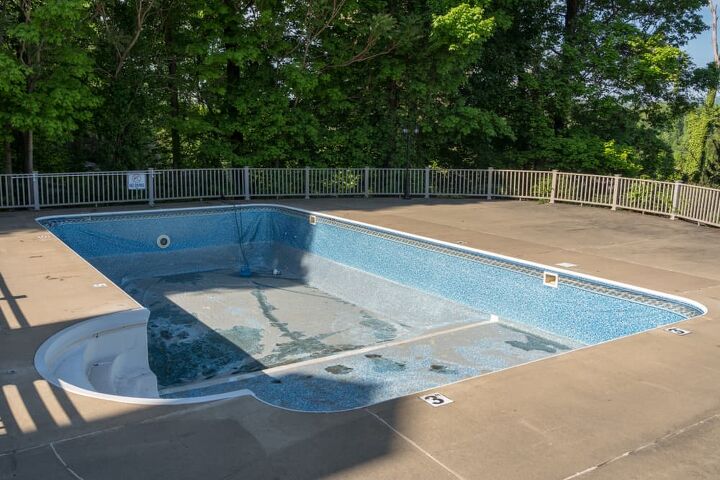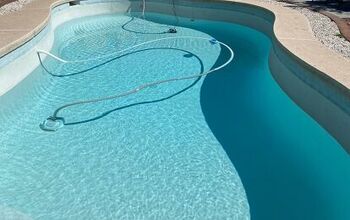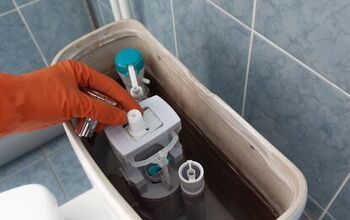Is It Illegal To Drain Your Pool Into The Street? (Find Out Now!)

Got a swimming pool? Where do you drain it? There are many situations that warrant draining your pool, such as winterization or significant algae, but you should always consider the ecosystem before draining or leveling the water in your pool.
In most states, it is not legal to drain your pool into the street. If you are draining your swimming pool into the street, you could be fined and summoned by local, municipal, or even state authorities. Draining a pool improperly can cause extensive damage to the environment, the community, and your personal property.
Before you drain your pool, here is what you should know:
Why Is It Illegal to Drain your Pool into the Street?
Essentially, draining your pool in any public street, thoroughfare, storm drain, or gutter system is prohibited. Most local codes, though there are likely some exceptions, indicate that you can be cited for wasting water, punishable by fines. Some regions without a large population of swimming pools may be less clear about the laws surrounding drainage, but you should consult with the office of water authority in these instances to avoid legal repercussions. This information is often found on local municipal websites.
Reasons to Drain your Swimming Pool
What would be reasons why you would need to drain your pool? After all, isn’t chemical treatment supposed to eliminate the need to continuously drain and refill a swimming pool? The short answer is ‘yes’, but there are a few situations that make draining a pool prudent.
When a pool has extreme algae growth, it is often called a ‘green’ swimming pool. If the algae impedes being able to see about six inches below the water’s surface, you may need to drain the pool to properly clean it. Otherwise, you may be able to shock or chemically-treat the water to remove the algae issue.
The primary causes of algae growth are:
- Improper PH balance.
- Total dissolved solids in excess of 1,500 parts per million, or a calcium hardness level of more than 350 ppm.
- A faulty or clogged filter.
- Significant changes in the weather, as algae grows in hot, humid environments.
- If your pool water is very dark or black in color.
Some other reasons why you would potentially drain and refill your swimming pool beyond algae include winterization of the pool after swim season. Also, you may choose to drain the water if your pool is not level. Talk to a pool service professional about alternatives to resolving these situations without draining the pool.
Draining a Pool into Storm Drains
It may be tempting to drain a green pool into a nearby storm drain; after all, these are for water and runoff, right? Never drain your swimming pool water into storm drains, curbs, gutters, ditches, catch basins, channels, or property that is owned by the city, state, or somebody else. The storm drain is not the same as the sewer system, which is where this wastewater belongs.
Can you Drain Pool Water into Manholes?
Thinking about draining your pool directly into a manhole? Think again: it is actually against the law to open or remove a manhole cover for any reason, as these can pose a significant safety risk. Leave the manhole alone and drain your pool properly.
The Problems with Draining a Pool in the Street
Why is it bad to drain pool water in the street or in public places? Draining pool water that potentially contains chemicals presents a hazard to the environment. The water can harm fish, animals, insects, and aquatic plants. The water from your pool is oxygen-deficient at this point, so it can kill those species that rely on water for life. The damage can be catastrophic to the balance of the ecosystem.
Another problem with draining pools publicly is erosion. The erosion along banks and streams can cause issues for years to come. Draining pools also can result in flooding; you could be unknowingly flooding the homes of your neighbors who live downhill or next door.
Potential Legal Implications Involved in Draining a Pool
Draining your swimming pool in the street, storm drains, around waterways, or on public property is illegal widely. Unless you specifically know the laws of your region and draining pools publicly is permitted, you risk legal repercussions and fines for doing so.
Anytime that you drain a pool, you run the risk of flooding your property, as well as your neighbors’. Pay heed to proper draining techniques and use the sanitary sewer line outside your home to be safe. While it takes a bit longer to drain properly, it ensures you don’t incur fines or costly damage in the process.
The Proper Way to Drain a Pool
Avoid the hassles and headaches by properly draining your pool; when you know that you will be draining your pool, stop adding chlorine to the water and uncover your pool for a week before. This helps to de-chlorinate the water before you drain it from the pool. There are some chemical agents that you may purchase that will de-chlorinate the water more quickly, too.
- Test the chlorine levels and turn off the pool filter system.
- Shut off the automatic fill function, if applicable. Make sure to do this at the circuit breaker to avoid potential shock.
- Do you know where the sewer clean-out access is located on your property? Carefully use a wrench to remove the cover with a wrench.
- Next, run a hose from the pool to the port for the sanitary sewer access port or the drain.
- On the other end of the hose, secure a submersible sump pump, which you then position in the deeper end of your pool. Keep an eye on the pump as it drains the pool, checking the system occasionally to ensure it is not clogged or that it does not back up. This is not a task to start when you will be away from the home. If a problem or clog occurs, contact a plumbing professional immediately.
- When the water has been drained, take care to remove the hoses, sump pump, and replace the cover on your sewer line.
- Turn your filtration and auto-fill systems back on at the breaker.
Do not leave your pool empty for long before refilling; the sun can cause damage to the finish and surface of a dry swimming pool.
Recycle the Water from a Swimming Pool
If you are going to drain the swimming pool, check the chlorine level first and determine if you might use the water to irrigate and water your landscaping and lawn. Some drought-prone areas, such as Dallas TX, encourage pool owners to use it to water their properties.
Some towns and cities are re-purposing the water from public pools to irrigate and water public green spaces in an effort to conserve resources. In these areas, the water is transferred from the public pools to a truck, which then is used to bring water where it is needed.
It is imperative to check the chlorine and pH levels of your water before you decide to irrigate plants and lawns with it. For the water to be safe to use on landscaping, the pH level should be between 7.0-8.0, and the chlorine level should be under 3ppm.
If you have a saltwater pool, most types of grass and ground cover may tolerate it fine but avoid using on salt-sensitive species, like citrus trees and hibiscus plants.
Related Questions
Why is draining a pool in the street a problem?
Draining a pool into the street can cause a lot of problems, including damage to the environment due to the chemicals and chlorine used in swimming pool water. The water can cause erosion and flooding, which can both be costly issues to address. Furthermore, draining your pool where you are not supposed to can result in hefty fines.
How and where should you drain your pool?
Draining a pool is a process, and you should drain the water directly into your sewer system using the sewer access line for your home and property- if it is not a saltwater pool. In some regions, pool owners are permitted to use their pool water for irrigation but do so carefully to avoid damaging your landscaping. Make sure the chlorine level is below 3ppm before using the water on any plants or foliage.

We are a team of passionate homeowners, home improvement pros, and DIY enthusiasts who enjoy sharing home improvement, housekeeping, decorating, and more with other homeowners! Whether you're looking for a step-by-step guide on fixing an appliance or the cost of installing a fence, we've here to help.
More by Upgraded Home Team

















![Standard Dining Room Table Dimensions [for 4, 6, 8, 10 and 12 People]](https://cdn-fastly.upgradedhome.com/media/2023/07/31/9074335/standard-dining-room-table-dimensions-for-4-6-8-10-and-12-people.jpg?size=350x220)









